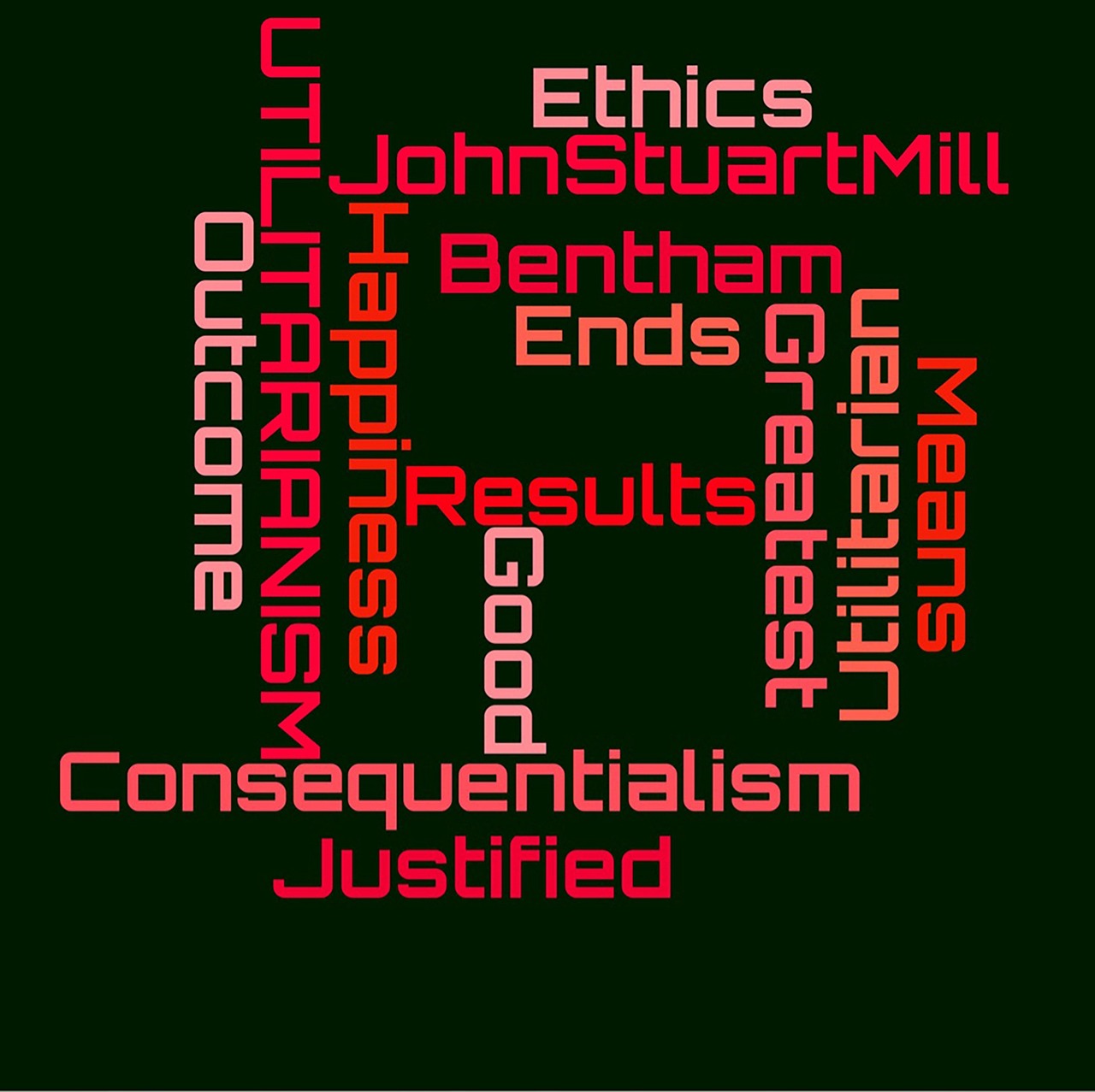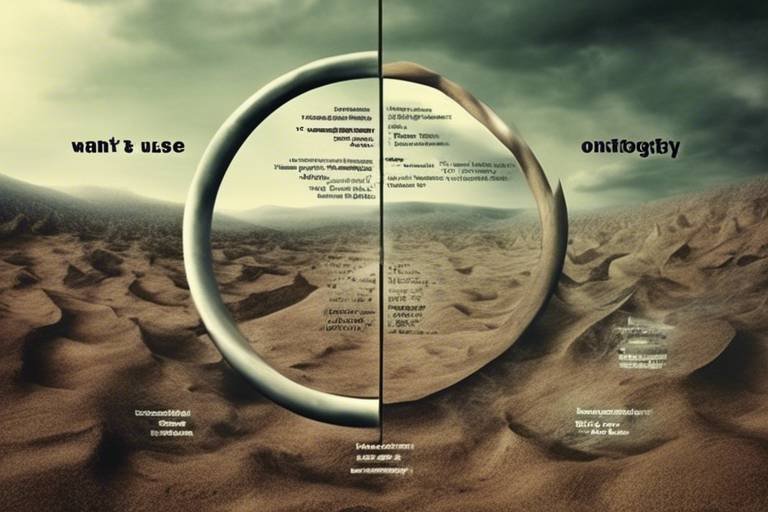Understanding Ethics Through a Metaphysical Lens
In a world brimming with complex moral dilemmas and ethical quandaries, the relationship between ethics and metaphysics often goes unnoticed. Yet, it is this very relationship that lays the groundwork for how we navigate our moral landscapes. By examining the philosophical perspectives that inform our ethical frameworks, we can gain a deeper understanding of why we make the choices we do. Imagine ethics as a grand tapestry, woven together with threads of metaphysical beliefs. Each thread represents a different philosophical view, influencing the overall picture of our moral reasoning. So, how do these threads intertwine, and what impact do they have on our daily decisions?
To explore this intricate relationship, we must first acknowledge that metaphysics delves into the nature of reality, existence, and the fundamental principles that govern our understanding of the world. Ethics, on the other hand, is concerned with what is right and wrong, good and bad. When we bring these two fields together, we begin to see how metaphysical assumptions shape our ethical theories and influence our moral judgments. For instance, consider the debate surrounding free will and determinism. If our actions are predetermined, what does that mean for our sense of accountability? This question not only challenges our ethical beliefs but also forces us to confront the very nature of our existence.
Moreover, the interplay between ethics and metaphysics extends beyond abstract theories. It has real-world implications that affect our interactions, societal norms, and even legal frameworks. Take a moment to reflect on how your own beliefs about morality have been shaped by your understanding of reality. Do you believe in objective moral truths, or do you think that ethics is subjective and varies from person to person? These fundamental questions highlight the importance of examining our metaphysical views as they relate to ethical decision-making.
As we delve deeper into this exploration, we will uncover the key metaphysical concepts that play a pivotal role in shaping our ethical perspectives. From the implications of free will versus determinism to the debates surrounding moral realism and anti-realism, each concept offers unique insights into the nature of morality. By understanding these concepts, we can better appreciate the philosophical underpinnings of various ethical theories, such as utilitarianism, deontology, and virtue ethics.
In this article, we will embark on a journey through the intersection of ethics and metaphysics, shedding light on how these two fields influence one another. We will examine how metaphysical beliefs inform our understanding of moral responsibility and accountability, explore the implications of different ethical theories through a metaphysical lens, and ultimately, enhance our comprehension of the ethical challenges we face in our lives. So, buckle up, as we navigate this fascinating terrain where philosophy meets morality!
- What is the relationship between ethics and metaphysics?
Ethics and metaphysics are interconnected fields, with metaphysical beliefs influencing our understanding of moral principles and ethical decision-making. - How do free will and determinism impact moral responsibility?
The debate between free will and determinism raises questions about accountability, challenging traditional views on moral responsibility. - What are some key metaphysical concepts in ethics?
Key concepts include free will, determinism, moral realism, and anti-realism, each shaping our ethical perspectives in different ways. - How do ethical theories relate to metaphysical assumptions?
Ethical theories like utilitarianism, deontology, and virtue ethics are influenced by metaphysical beliefs, affecting their moral claims and implications.

The Intersection of Ethics and Metaphysics
When we think about ethics, we often picture a set of rules or guidelines that dictate what is right or wrong. But what if I told you that these moral frameworks are deeply intertwined with metaphysical principles? The intersection of ethics and metaphysics is where the abstract meets the practical, where philosophical ideas shape our understanding of morality. Imagine standing at a crossroads, with one path leading to ethical theories and the other to the fundamental nature of reality. The choices we make in life, and the reasons behind those choices, are often influenced by our metaphysical beliefs.
At its core, metaphysics deals with questions about existence, reality, and the nature of things. It asks profound questions like, "What is the nature of reality?" and "Do we have free will?" These questions are not just philosophical musings; they have real implications for how we view ethics. For instance, if we believe in a deterministic universe, where every action is predetermined by prior events, how does that affect our understanding of moral responsibility? Are we truly accountable for our actions if they are merely the result of a chain of events beyond our control?
Moreover, the beliefs we hold about the nature of morality itself—whether it is subjective or objective—are deeply metaphysical. If we subscribe to moral realism, we believe that there are objective moral truths that exist independently of human opinion. On the other hand, if we lean towards moral anti-realism, we may argue that moral truths are constructed by societies and cultures, thus challenging the universality of ethical principles.
This intersection also extends to how we interpret ethical theories. For example, a utilitarian approach, which emphasizes the greatest good for the greatest number, reflects a metaphysical belief in the importance of outcomes and consequences. In contrast, deontological ethics, which focuses on duty and rules, is rooted in the belief that certain actions are inherently right or wrong, regardless of their consequences. This divergence in ethical theories illustrates how metaphysical assumptions can lead to vastly different moral conclusions.
In essence, the relationship between ethics and metaphysics is a dynamic interplay that shapes our moral landscape. Understanding this intersection not only enriches our grasp of ethical theories but also challenges us to reflect on our beliefs about reality, existence, and our place within it. So, next time you ponder a moral dilemma, consider the metaphysical underpinnings that might be influencing your thoughts. Are you guided by a belief in free will, or do you lean towards a deterministic view of the universe? The answers to these questions could very well shape your ethical outlook.

Key Metaphysical Concepts in Ethics
The realm of ethics is deeply intertwined with metaphysical concepts that shape our understanding of morality and moral responsibility. At the heart of this relationship lies the exploration of fundamental questions: What is the nature of reality? Do we possess free will, or are our actions predetermined? These inquiries not only challenge our philosophical beliefs but also influence how we perceive ethical dilemmas in our everyday lives.
One of the key metaphysical concepts in ethics is free will. This concept suggests that individuals have the capacity to make choices independent of external constraints. In contrast, determinism posits that every event, including human actions, is determined by preceding events in accordance with the laws of nature. The clash between these two ideas raises significant questions about moral accountability. If our actions are predetermined, can we truly be held responsible for them? This debate is not merely academic; it has profound implications for how we judge ethical behavior and construct our legal systems.
Another critical concept is moral realism, which asserts that there are objective moral truths that exist independently of human beliefs or perceptions. This perspective contrasts sharply with moral anti-realism, which challenges the existence of universal ethical standards, suggesting instead that moral truths are subjective and culturally constructed. The tension between these viewpoints leads to rich discussions about the nature of morality itself and whether ethical claims can be universally applicable or are merely reflections of personal or societal preferences.
To illustrate the importance of these metaphysical concepts, consider the following table that summarizes the implications of free will and determinism on moral responsibility:
| Concept | Implications for Moral Responsibility |
|---|---|
| Free Will | Individuals are accountable for their choices; moral praise or blame is justified. |
| Determinism | Moral responsibility is diminished; actions are viewed as products of prior causes. |
Additionally, the interplay between these metaphysical concepts can be seen in various ethical theories. For instance, the debate over free will often influences utilitarianism and deontological ethics. Utilitarianism focuses on the outcomes of actions, which can be interpreted differently depending on one's stance on free will. Meanwhile, deontological ethics emphasizes duty and intention, raising questions about whether individuals can truly fulfill their moral obligations if their choices are predetermined.
In conclusion, understanding these key metaphysical concepts is essential for grasping the complexities of ethical theories and moral reasoning. As we navigate ethical dilemmas, recognizing the underlying metaphysical assumptions can provide clarity and depth to our discussions about morality. The interplay between free will, determinism, moral realism, and anti-realism not only enriches our philosophical discourse but also shapes our everyday ethical decisions.
- What is the difference between free will and determinism? Free will suggests that individuals can make choices independently, while determinism asserts that all events, including human actions, are determined by prior causes.
- How does moral realism differ from moral anti-realism? Moral realism posits that objective moral truths exist, whereas moral anti-realism argues that moral claims are subjective and dependent on individual or cultural beliefs.
- Why are these metaphysical concepts important in ethics? They provide the foundational beliefs that influence our understanding of moral responsibility, ethical decision-making, and the nature of moral truths.

Free Will vs. Determinism
The debate between free will and determinism is one of the most captivating discussions in philosophy, particularly when it comes to ethics. Imagine standing at a crossroads, where every choice you make seems to shape your destiny. This metaphorical landscape raises a crucial question: Are we truly the architects of our own lives, or are we merely puppets dancing to the strings of fate? The implications of this debate stretch far beyond philosophical musings; they touch the core of how we understand moral responsibility.
On one side of the spectrum, proponents of free will argue that individuals possess the ability to make choices independent of external influences. This perspective emphasizes personal accountability, suggesting that we are responsible for our actions because we have the power to choose differently. For example, if someone commits a wrongdoing, the free will perspective would hold them accountable, asserting that they could have chosen a more ethical path. In this view, moral judgments hinge on the belief that people can act against their inclinations or societal pressures.
Conversely, the deterministic view posits that every event, including human actions, is a result of preceding events governed by the laws of nature. In this framework, our choices are merely the end points of a vast chain of causality, leaving little room for genuine autonomy. Think of it like a massive game of dominoes; once the first piece is tipped, the rest inevitably follow. If we accept determinism, the question arises: Can we hold individuals morally accountable for actions that were seemingly predestined? This perspective challenges traditional ethical frameworks, as it suggests that individuals might not be as culpable for their actions as we once thought.
To further illustrate this complex interplay, consider the following table summarizing the key distinctions between free will and determinism:
| Aspect | Free Will | Determinism |
|---|---|---|
| Definition | The ability to choose freely among alternatives | The belief that all events are caused by preceding events |
| Moral Responsibility | Individuals are accountable for their choices | Accountability is diminished due to predetermined factors |
| Philosophical Implications | Supports concepts of justice and punishment | Challenges the basis for moral judgments |
As we navigate this philosophical terrain, it becomes apparent that the implications of free will versus determinism extend into our everyday lives. For instance, consider how our legal systems are structured around the assumption that individuals have the capacity to choose their actions. If determinism holds true, our entire approach to justice may require reevaluation. Should we focus on rehabilitation rather than punishment, given that the individual may not have truly "chosen" their actions?
Ultimately, the tension between free will and determinism invites us to reflect on our beliefs about human nature and morality. It forces us to confront uncomfortable questions about accountability, justice, and the very essence of what it means to be human. Are we simply navigating a path laid out for us, or are we actively shaping our destinies? This ongoing dialogue not only enriches our understanding of ethics but also deepens our appreciation for the complexity of human experience.
- What is free will? Free will is the ability to make choices that are not determined by past events or external forces.
- What is determinism? Determinism is the philosophical belief that all events are determined by previously existing causes.
- How do free will and determinism impact moral responsibility? Free will suggests individuals are accountable for their choices, while determinism raises questions about the extent of that accountability.
- Can both free will and determinism coexist? Some philosophers argue for compatibilism, suggesting that free will and determinism can coexist in a way that allows for moral responsibility.

Impacts on Moral Responsibility
The debate surrounding free will and determinism has profound implications for our understanding of moral responsibility. If we consider a deterministic universe, where every action and decision is the result of preceding events and conditions, we are led to question whether individuals can truly be held accountable for their choices. Imagine a puppet on strings, where every movement is dictated by the puppeteer; can we blame the puppet for its actions? This analogy illustrates the crux of the issue: if our actions are preordained, the concept of moral responsibility becomes murky at best.
On the other hand, the belief in free will posits that individuals have the capacity to make choices independent of external influences. This perspective supports the notion that we are accountable for our actions, as we have the power to choose between right and wrong. For instance, consider a person faced with a moral dilemma, such as whether to help a stranger in need or ignore them. If they believe they have the freedom to choose, they can be praised or blamed for their decision. The implications of this belief extend beyond personal accountability; they shape societal norms and legal systems that rely on the assumption of free will.
However, the reality is often more complex. Many people find themselves grappling with the tension between these two viewpoints. For instance, someone might argue, "I wanted to help, but my upbringing and circumstances made it impossible." This highlights a critical challenge: how do we reconcile our understanding of personal responsibility with the influences of genetics, environment, and social context? It's a bit like trying to untangle a ball of yarn—each thread represents a different factor influencing our choices, and pulling on one can affect the others.
To further explore these implications, we can categorize the impacts of free will and determinism on moral responsibility into several key areas:
- Legal Accountability: In a legal context, the assumption of free will is foundational. Courts often operate under the premise that individuals can choose to obey or break the law, which influences sentencing and rehabilitation efforts.
- Personal Relationships: Our interactions with others are deeply influenced by our beliefs about moral responsibility. If we view someone as fully responsible for their actions, we may be less inclined to forgive them for wrongdoing.
- Societal Norms: Societies that emphasize personal accountability tend to foster environments where individuals are encouraged to take responsibility for their actions, leading to a culture of self-improvement and ethical behavior.
Ultimately, the question of moral responsibility is not just a philosophical exercise; it has real-world implications that affect how we live our lives, interact with others, and structure our societies. As we navigate this complex landscape, it becomes increasingly important to consider the interplay between our beliefs about free will and determinism, and how these beliefs shape our moral frameworks.
- What is the difference between free will and determinism? Free will suggests that individuals have the power to make choices independently, while determinism posits that all actions are predetermined by prior events.
- How does determinism affect moral responsibility? If our actions are predetermined, it challenges the notion that we can be held accountable for our choices.
- Can we reconcile free will and determinism? Some philosophers propose compatibilism, which argues that free will and determinism can coexist, allowing for moral responsibility within a deterministic framework.

Philosophical Perspectives
When diving into the realm of ethics through a metaphysical lens, it's crucial to understand the various that shape our views on free will and moral responsibility. Each perspective offers a unique framework that influences how we perceive our actions and their consequences. Let's explore some of the most significant viewpoints: compatibilism, libertarianism, and hard determinism.
Compatibilism suggests that free will and determinism are not mutually exclusive. Proponents argue that even in a deterministic universe, individuals can still possess the capacity to make choices. This perspective posits that as long as our actions align with our desires and intentions, we can be considered free. Imagine a river flowing steadily; while the water follows a predetermined path, it can still twist and turn around obstacles. Similarly, compatibilists believe we navigate our lives within the constraints of determinism while exercising our free will.
On the other hand, libertarianism takes a more assertive stance on free will, arguing that individuals possess the ability to make choices independent of any deterministic forces. Libertarians contend that for moral responsibility to exist, individuals must have genuine control over their actions. This perspective can be likened to a person standing at a crossroads, with the power to choose any path without being bound by prior conditions. For libertarians, this freedom is essential for moral accountability; without it, the very foundation of ethics crumbles.
In stark contrast, hard determinism asserts that every event, including human actions, is determined by preceding events in accordance with the laws of nature. This viewpoint challenges the notion of free will, suggesting that our choices are merely the result of a complex web of prior causes. If we think of ourselves as marionettes, hard determinists argue that our strings are pulled by the forces of nature, leaving little room for genuine choice. This perspective raises profound questions about moral responsibility: if our actions are predetermined, can we truly be held accountable for them?
Each of these philosophical perspectives offers valuable insights into the ongoing debate about free will and moral responsibility. The implications of these views extend beyond theoretical discussions; they influence how we approach ethical dilemmas in our everyday lives. For instance, consider a scenario where someone commits a crime. A compatibilist might argue that while the individual acted out of a predetermined set of circumstances, they still had the capacity to choose differently. In contrast, a hard determinist could argue that the person was inevitably driven to that action by prior events, thus complicating the notion of accountability.
As we navigate the complexities of ethical theories, it becomes evident that our understanding of free will shapes our moral frameworks. The philosophical perspectives we adopt not only influence our views on ethics but also impact how we engage with others and the moral judgments we make. Ultimately, grappling with these ideas invites us to reflect on the nature of our choices and the responsibility we bear for our actions, challenging us to consider the deeper metaphysical assumptions that underpin our ethical beliefs.
- What is the difference between compatibilism and libertarianism? Compatibilism asserts that free will and determinism can coexist, while libertarianism argues for the existence of free will independent of determinism.
- How does hard determinism challenge moral responsibility? Hard determinism suggests that all actions are determined by prior causes, raising questions about whether individuals can be held accountable for their actions.
- Why are philosophical perspectives important in ethics? They shape our understanding of moral responsibility and influence how we approach ethical dilemmas in real-life situations.

Moral Realism and Anti-Realism
Moral realism and anti-realism represent two contrasting views in the realm of ethics that significantly influence our understanding of moral truths. At its core, moral realism posits that there exist objective moral truths that are independent of human beliefs or feelings. This means that certain actions can be deemed right or wrong regardless of individual or cultural perspectives. For instance, a moral realist would argue that acts such as murder or theft are inherently wrong, irrespective of societal norms or personal opinions. This perspective provides a sturdy foundation for ethical discussions, asserting that moral claims can be evaluated based on their truthfulness.
On the other hand, anti-realism challenges this notion by suggesting that moral truths are not objective but rather subjective or constructed by societal consensus. From this viewpoint, what is considered "right" or "wrong" can vary dramatically across different cultures and contexts. For example, an anti-realist might argue that practices viewed as ethical in one society could be deemed unethical in another, emphasizing the fluidity of moral standards. This raises important questions about the universality of ethics and whether we can truly claim any moral principle as absolute.
The debate between these two perspectives is not just academic; it has profound implications for how we approach ethical dilemmas in everyday life. Consider the following aspects:
- Implications for Moral Discourse: If moral realism is true, discussions about ethics can be grounded in objective truths, leading to more constructive debates. Conversely, if anti-realism holds, discussions may become more about personal feelings and societal norms, potentially leading to relativism.
- Legal and Social Frameworks: Moral realism might support the idea of universal human rights, while anti-realism could justify differing legal systems based on cultural contexts.
- Accountability and Responsibility: Realists may argue that individuals can be held accountable for their actions based on objective moral standards, while anti-realists might contend that accountability is contingent upon societal norms.
In summary, the tension between moral realism and anti-realism invites us to reflect on the nature of morality itself. Are our ethical beliefs rooted in something greater than ourselves, or are they simply products of our environments and experiences? This fundamental question not only shapes academic discourse but also influences how we navigate the complexities of moral decision-making in our daily lives.
- What is moral realism? Moral realism is the belief that there are objective moral truths that exist independently of human beliefs.
- What is anti-realism? Anti-realism is the view that moral truths are subjective and constructed by societal norms and personal beliefs.
- How do moral realism and anti-realism affect ethical discussions? Moral realism provides a foundation for objective debates, while anti-realism emphasizes the variability of moral standards across cultures.
- Can moral realism and anti-realism coexist? Some philosophers argue for a middle ground, suggesting that while some moral truths may be objective, others could be context-dependent.

Ethical Theories Through a Metaphysical Lens
When we dive into the world of ethics, it’s like peeling back layers of an onion—each layer reveals deeper insights into our moral fabric. Ethical theories are not just abstract concepts; they are deeply intertwined with metaphysical beliefs that shape how we perceive right and wrong. Just as a painter uses different colors to create a masterpiece, philosophers use various metaphysical assumptions to construct their ethical frameworks. This section explores how major ethical theories—utilitarianism, deontology, and virtue ethics—are influenced by the metaphysical underpinnings that give them life.
Utilitarianism, for instance, is often viewed through the lens of consequentialism, which emphasizes the outcomes of actions. The metaphysical belief here is that happiness and well-being can be quantified and compared. This leads us to consider questions like: What does it mean to maximize happiness? Can we truly measure the happiness of one person against another? As we explore utilitarianism, we see that its ethical claims are heavily reliant on the assumption that we can objectively assess the consequences of our actions. This belief in a measurable outcome is what makes utilitarianism a compelling, yet controversial, ethical theory.
On the flip side, we have deontological ethics, which is grounded in the belief that certain actions are inherently right or wrong, regardless of their consequences. This theory hinges on metaphysical commitments to duty and moral laws. Imagine a world where every action is dictated by a strict set of rules; this is the essence of deontology. The key question here is: What gives these moral laws their authority? Deontologists argue that intention matters, and that adhering to moral principles is essential, even if the outcomes are less than favorable. This perspective challenges us to think about the nature of moral obligations and whether they exist independently of human opinion.
Lastly, we cannot overlook virtue ethics, which shifts the focus from rules and consequences to the character of the moral agent. Here, metaphysical beliefs about human nature and the concept of flourishing play a crucial role. Virtue ethicists argue that ethical behavior stems from cultivating good character traits, or virtues. This raises fascinating discussions about what it means to live a good life. Are virtues universal, or are they culturally relative? How does one define 'flourishing'? These questions reveal the intricate dance between ethics and metaphysics, suggesting that our understanding of morality is as much about who we are as it is about what we do.
In summary, the relationship between ethical theories and metaphysical beliefs is complex and multifaceted. Each ethical framework brings its own set of assumptions to the table, influencing how we navigate moral dilemmas. By examining these theories through a metaphysical lens, we gain a richer understanding of the philosophical foundations that guide our ethical reasoning.
- What is the main difference between utilitarianism and deontology? Utilitarianism focuses on the consequences of actions to determine their moral value, while deontology emphasizes adherence to moral rules or duties regardless of the outcomes.
- How does virtue ethics differ from other ethical theories? Virtue ethics centers on the character and virtues of the moral agent, rather than specific actions or consequences, promoting the idea that moral excellence leads to a good life.
- Can ethical theories coexist? Yes, many people find value in integrating aspects of different ethical theories to form a more comprehensive moral framework that suits their beliefs and experiences.

Utilitarianism and Consequentialism
Utilitarianism, a prominent ethical theory, is deeply intertwined with the concept of consequentialism, which asserts that the morality of an action is determined solely by its outcomes. Imagine standing at a crossroads, with each path representing a different choice. Utilitarianism encourages you to choose the path that leads to the greatest happiness for the greatest number of people. This principle, often summarized by the phrase "the ends justify the means," positions happiness as the ultimate goal of moral action. However, this raises intriguing questions: How do we measure happiness? Who decides what constitutes the "greatest good"? These inquiries reveal the complexities embedded within utilitarian thought.
At its core, utilitarianism relies on a few fundamental principles, which can be summarized as follows:
- Consequentialism: The outcomes of actions are the primary basis for any judgment about the rightness or wrongness of those actions.
- Utility: Actions are evaluated based on their ability to produce pleasure or happiness and reduce suffering.
- Impartiality: Every individual's happiness counts equally; no one's well-being is prioritized over another's.
These principles illustrate how utilitarianism diverges from other ethical theories. For instance, unlike deontological ethics, which emphasizes duty and rules, utilitarianism is flexible and adaptable, focusing on the results rather than the intentions behind actions. This adaptability is both a strength and a weakness. On one hand, it allows for practical decision-making in complex situations; on the other, it can lead to morally questionable justifications for harmful actions if they are deemed to produce a net positive outcome.
To further illustrate this point, consider a classic thought experiment known as the "trolley problem." In this scenario, you have the option to pull a lever to divert a runaway trolley onto a track where it will kill one person instead of five. A utilitarian approach would advocate for pulling the lever, as it maximizes overall happiness by saving more lives. However, this raises ethical dilemmas about the value of individual rights and the moral implications of actively causing harm, even for a perceived greater good.
Moreover, utilitarianism is often critiqued for its reliance on a somewhat subjective measure of happiness. Different cultures, societies, and individuals may define happiness in vastly different ways. For example, what brings joy to one person may be a source of distress for another. This subjectivity can lead to ethical conflicts and disagreements, challenging the universality of utilitarian principles.
In practice, utilitarianism has influenced various fields, including economics, public policy, and healthcare. Policymakers often use utilitarian principles to allocate resources effectively, aiming to achieve the highest overall benefit for society. However, the challenge remains: how do we ensure that the pursuit of the greater good doesn’t infringe on individual rights or lead to unjust outcomes?
In conclusion, while utilitarianism and consequentialism provide a compelling framework for evaluating ethical decisions based on outcomes, they also pose significant philosophical challenges. As we navigate the complexities of moral reasoning, it’s essential to consider not only the consequences of our actions but also the ethical principles that guide us. After all, in the quest for happiness, we must remember that the journey is just as important as the destination.
- What is the main idea behind utilitarianism? Utilitarianism focuses on maximizing happiness and minimizing suffering, evaluating actions based on their consequences.
- How does utilitarianism differ from deontological ethics? While utilitarianism prioritizes outcomes, deontological ethics emphasizes adherence to moral rules and duties regardless of the consequences.
- Can utilitarianism justify harmful actions? Yes, utilitarianism can potentially justify harmful actions if they are believed to produce a greater overall good, leading to ethical dilemmas.
- What are some criticisms of utilitarianism? Critics argue that utilitarianism can be overly simplistic, subjective, and may disregard individual rights in favor of collective happiness.

Deontological Ethics and Duty
When we dive into the world of deontological ethics, we find ourselves in a realm where duty reigns supreme. Unlike consequentialist theories, which focus on the outcomes of actions, deontology emphasizes the inherent morality of actions themselves. This means that what matters most is not the result of our actions but rather the intentions behind them and the adherence to moral rules. Imagine a world where every choice is weighed not by its consequences but by a strict moral compass—this is the essence of deontological ethics.
At the heart of deontological ethics lies the idea of duty. Duties are obligations that we have towards others and ourselves. They are often derived from universal moral laws, which dictate what is right and wrong. For instance, consider the duty to tell the truth. Regardless of the potential consequences—whether it hurts someone's feelings or leads to negative outcomes—deontological ethics would argue that honesty is a moral obligation. This unwavering commitment to duty can sometimes feel like a double-edged sword, as it may require individuals to act against their own interests for the sake of a principle.
One of the most influential philosophers in this realm is Immanuel Kant, who proposed the Categorical Imperative, a fundamental principle of deontology. Kant argued that we should act only according to that maxim whereby we can, at the same time, will that it should become a universal law. In simpler terms, before taking an action, we should consider whether it would be acceptable if everyone acted in the same way. This principle encourages individuals to think critically about their actions and their alignment with moral duties.
To further illustrate this concept, let’s consider a few key duties that are often discussed within deontological frameworks:
- Truthfulness: The obligation to tell the truth, regardless of the consequences.
- Respect for Persons: Treating individuals as ends in themselves, not merely as means to an end.
- Justice: Upholding fairness and equality in all interactions.
These duties serve as guiding principles that shape our moral landscape. They compel us to act with integrity and to consider the ethical implications of our choices. However, the rigidity of deontological ethics can lead to moral dilemmas. For instance, what if telling the truth puts someone in harm's way? This is where the tension between duty and the potential consequences of our actions becomes apparent.
In conclusion, deontological ethics offers a compelling framework for understanding morality through the lens of duty. It challenges us to prioritize our obligations and to act in accordance with universal moral laws. While it may not provide all the answers to our ethical dilemmas, it certainly enriches our understanding of what it means to act morally. As we navigate the complexities of ethical decision-making, reflecting on our duties can help illuminate the path forward.
- What is deontological ethics? Deontological ethics is a moral theory that emphasizes the importance of duty and adherence to moral rules, rather than focusing solely on the consequences of actions.
- Who is the main philosopher associated with deontological ethics? Immanuel Kant is one of the most influential philosophers in deontological ethics, known for his Categorical Imperative.
- How does deontological ethics differ from consequentialism? While deontological ethics focuses on the morality of actions based on duties, consequentialism evaluates actions based on their outcomes.
- Can deontological ethics lead to moral dilemmas? Yes, the strict adherence to duties can sometimes create conflicts when duties clash or when the consequences of fulfilling a duty could cause harm.

The Role of Meta-Ethics
Meta-ethics serves as a fascinating bridge between the philosophical foundations of ethics and our everyday moral reasoning. It goes beyond simply asking what is right or wrong; instead, it probes into the very nature of morality itself. What do we mean when we say something is 'good' or 'bad'? This question is at the heart of meta-ethical inquiry. By dissecting the language and concepts we use in ethical discussions, meta-ethics reveals the underlying assumptions that shape our moral frameworks. It invites us to consider not just the ethical theories we subscribe to, but also the meaning and implications of those theories.
One of the key areas of focus in meta-ethics is the distinction between ethical subjectivism and ethical objectivism. Ethical subjectivism posits that moral truths are dependent on individual feelings or cultural contexts. In contrast, ethical objectivism argues that there are universal moral truths that exist independently of human beliefs. This dichotomy raises important questions about the nature of moral claims and whether they hold any objective validity. For instance, if moral statements are merely reflections of personal preferences, can we ever truly engage in moral debate? Or are we simply expressing our own subjective viewpoints?
Moreover, meta-ethics delves into the implications of these perspectives for ethical discourse. If we accept ethical subjectivism, we might find ourselves in a moral relativism trap, where every opinion is equally valid, potentially leading to a breakdown in moral consensus. On the other hand, if we lean towards ethical objectivism, we must grapple with the challenge of justifying our claims to universal moral truths. This often involves rigorous philosophical argumentation and the exploration of various ethical theories that attempt to establish a foundation for these truths.
To illustrate these concepts further, consider the following table that outlines the differences between ethical subjectivism and objectivism:
| Aspect | Ethical Subjectivism | Ethical Objectivism |
|---|---|---|
| Definition | Moral truths are based on individual or cultural beliefs. | Moral truths exist independently of human opinions. |
| Nature of Moral Claims | Relative and variable; can differ across contexts. | Universal and consistent; applicable to all rational beings. |
| Implications for Debate | Leads to moral relativism; difficult to reach consensus. | Encourages the search for common moral ground. |
Understanding these meta-ethical perspectives is crucial for engaging in meaningful discussions about moral issues. They shape not only our theoretical approaches to ethics but also our practical decision-making in real-world situations. When faced with ethical dilemmas, recognizing whether we are operating from a subjective or objective standpoint can significantly influence our conclusions and actions.
In conclusion, meta-ethics plays a pivotal role in shaping our understanding of morality. By examining the nature of ethical statements and the meanings behind them, we can better navigate the complex landscape of moral philosophy and improve our ethical reasoning. As we continue to explore these themes, we are reminded that the questions of morality are as much about understanding ourselves and our beliefs as they are about the ethical principles we uphold.
- What is the difference between meta-ethics and normative ethics?
Meta-ethics focuses on the nature and meaning of moral statements, while normative ethics provides frameworks for determining what is right or wrong. - Can ethical subjectivism lead to moral chaos?
Yes, if everyone’s moral views are equally valid, it can result in a lack of consensus and difficulty in resolving moral conflicts. - How does meta-ethics influence everyday moral decisions?
Understanding the foundations of our moral beliefs can help us make more informed and consistent ethical choices in our daily lives.

Ethical Subjectivism vs. Objectivism
When diving into the fascinating world of ethics, one cannot overlook the intense debate between ethical subjectivism and ethical objectivism. These two philosophical positions represent opposing views on the nature of moral truths, and understanding them is crucial for anyone interested in the foundations of ethical reasoning. At its core, ethical subjectivism posits that moral judgments are based on individual feelings, beliefs, or cultural contexts. In other words, what is considered "right" or "wrong" can vary dramatically from one person to another, or from one society to another. This perspective can be likened to a painter with a palette of colors; just as each artist may choose different hues to express their vision, individuals may interpret moral dilemmas through their unique lenses of experience and emotion.
On the flip side, ethical objectivism asserts that there are universal moral truths that exist independently of individual opinions or societal norms. Think of it as a compass that points to a fixed north; no matter where you are or what you believe, the north remains constant and unchanging. Objectivists argue that some actions are inherently right or wrong, regardless of personal beliefs or cultural practices. This view supports the idea that moral standards can be discovered through reason, observation, or even divine command, making them applicable to all rational beings.
The clash between these two perspectives raises several intriguing questions. For instance, if morality is subjective, how can we resolve conflicts between differing moral beliefs? Imagine two friends who disagree about the morality of a particular action; if both perspectives are equally valid, how do they find common ground? Conversely, if morality is objective, what happens to those who live in cultures with vastly different moral frameworks? Can we impose our moral beliefs on others, or should we respect their subjective interpretations?
To further illustrate the differences between ethical subjectivism and objectivism, let's take a look at the following table:
| Aspect | Ethical Subjectivism | Ethical Objectivism |
|---|---|---|
| Definition | Moral truths are based on individual or cultural beliefs. | Moral truths exist independently of individual beliefs. |
| Nature of Morality | Fluid and variable, can change over time. | Fixed and universal, applicable to all. |
| Conflict Resolution | Negotiation and dialogue based on personal perspectives. | Appeal to universal principles or standards. |
| Examples | Views on euthanasia may differ based on personal beliefs. | Murder is universally considered wrong, regardless of context. |
Ultimately, the debate between ethical subjectivism and objectivism is not merely academic; it has real-world implications for how we approach moral issues in society. Whether in discussions about human rights, environmental ethics, or social justice, understanding where one stands on this spectrum can significantly influence one's perspective and actions. As we navigate through complex ethical landscapes, it becomes essential to recognize the weight of our beliefs and the impact they have on our interactions with others.
- What is ethical subjectivism?
Ethical subjectivism is the view that moral judgments are based on individual feelings and beliefs, meaning that what is considered right or wrong can vary from person to person. - What is ethical objectivism?
Ethical objectivism holds that there are universal moral truths that exist independently of individual opinions or cultural practices. - How do ethical subjectivism and objectivism differ?
Subjectivism sees morality as fluid and personal, while objectivism views it as fixed and universal. - Can ethical subjectivism lead to moral relativism?
Yes, ethical subjectivism can lead to moral relativism, where moral standards are seen as varying across different cultures and individuals.

Implications for Ethical Discourse
When we dive into the realm of meta-ethics, we uncover a treasure trove of insights that profoundly impact how we engage in ethical discussions. The debate between ethical subjectivism and objectivism is not just academic; it shapes our everyday conversations and decisions about right and wrong. For instance, if we lean towards subjectivism, we might believe that moral truths are merely reflections of personal feelings or cultural norms. This perspective encourages a more flexible approach to ethics, fostering a climate where diverse opinions can coexist. However, it also raises questions about the validity of moral claims—if everyone’s view is equally valid, can we ever truly resolve ethical disputes?
On the flip side, adopting an objectivist stance suggests that there are universal moral truths that apply to all, regardless of individual beliefs. This perspective can create a sense of shared responsibility and accountability, pushing societies towards common ethical standards. However, this can lead to conflicts when differing cultural or individual beliefs clash with these so-called universal truths. It raises a critical question: how do we navigate the tension between respecting cultural diversity and upholding universal moral principles?
Moreover, the implications of these meta-ethical perspectives extend beyond mere philosophical debate; they influence real-world ethical practices. For example, in legal systems, a more objective approach might advocate for laws that reflect universal moral standards, while a subjective approach might emphasize restorative justice, focusing on individual circumstances and cultural contexts. This brings us to the heart of ethical discourse: how can we ensure that our discussions are not only intellectually rigorous but also practically relevant?
In practical terms, understanding these implications can enhance our ability to engage in meaningful ethical discussions. When we recognize the underlying metaphysical assumptions that shape our views, we can better appreciate the complexities involved in moral debates. This awareness encourages us to approach ethical dilemmas with an open mind, facilitating dialogue that respects differing viewpoints while striving for a deeper understanding of the issues at hand.
To illustrate this further, consider the following table that outlines the key differences between ethical subjectivism and objectivism:
| Aspect | Ethical Subjectivism | Ethical Objectivism |
|---|---|---|
| Definition | Moral truths are based on personal feelings or cultural norms. | Moral truths exist independently of individual beliefs. |
| Implications | Encourages diverse opinions and personal moral frameworks. | Promotes universal standards and shared moral accountability. |
| Conflict Resolution | Focuses on dialogue and understanding individual contexts. | Seeks to establish common ground based on universal truths. |
In conclusion, the implications for ethical discourse are profound and multifaceted. By understanding the distinctions between subjectivism and objectivism, we can engage in more constructive conversations about morality. This not only enriches our understanding but also enhances our ability to navigate the complex ethical landscapes of our lives and societies.
- What is the difference between ethical subjectivism and objectivism? Ethical subjectivism suggests that moral truths are based on personal feelings, while ethical objectivism asserts that there are universal moral truths that apply to everyone.
- How do these perspectives influence real-world ethical discussions? Subjectivism encourages diverse opinions and understanding, while objectivism promotes shared moral standards and accountability.
- Can ethical subjectivism and objectivism coexist? Yes, many ethical frameworks incorporate aspects of both, allowing for a nuanced approach to moral discussions.
Frequently Asked Questions
- What is the relationship between ethics and metaphysics?
Ethics and metaphysics are intertwined in that metaphysical principles often shape our understanding of moral frameworks. For instance, how we view concepts like free will and moral truths can significantly influence our ethical decision-making. Essentially, metaphysics provides the foundational beliefs that underpin our moral reasoning.
- How does free will affect moral responsibility?
The debate between free will and determinism raises questions about accountability. If our actions are predetermined, can we truly be held responsible for them? This dilemma challenges traditional views of moral responsibility, suggesting that our understanding of free will is crucial in determining how we perceive ethical accountability.
- What are the key differences between moral realism and anti-realism?
Moral realism posits that there are objective moral truths that exist independently of individual beliefs, while anti-realism argues against the existence of universal ethical standards. This contrast shapes how ethical discourse is conducted, influencing whether we see moral claims as absolute or subjective.
- Can you explain utilitarianism and its metaphysical implications?
Utilitarianism focuses on the consequences of actions, emphasizing the greatest happiness for the greatest number. This ethical theory reflects metaphysical beliefs about happiness and well-being, suggesting that the outcomes of our actions are paramount in ethical decision-making.
- What role does meta-ethics play in understanding morality?
Meta-ethics examines the nature of ethical statements and the meanings behind moral language. It reveals how metaphysical assumptions influence our discussions about morality, such as whether moral truths are subjective or objective, and shapes the way we engage with ethical dilemmas.
- How do ethical subjectivism and objectivism differ?
Ethical subjectivism argues that moral truths are dependent on individual perspectives, while ethical objectivism asserts that moral truths exist independently of personal beliefs. This fundamental difference affects how we approach moral debates and understand ethical issues in society.



















